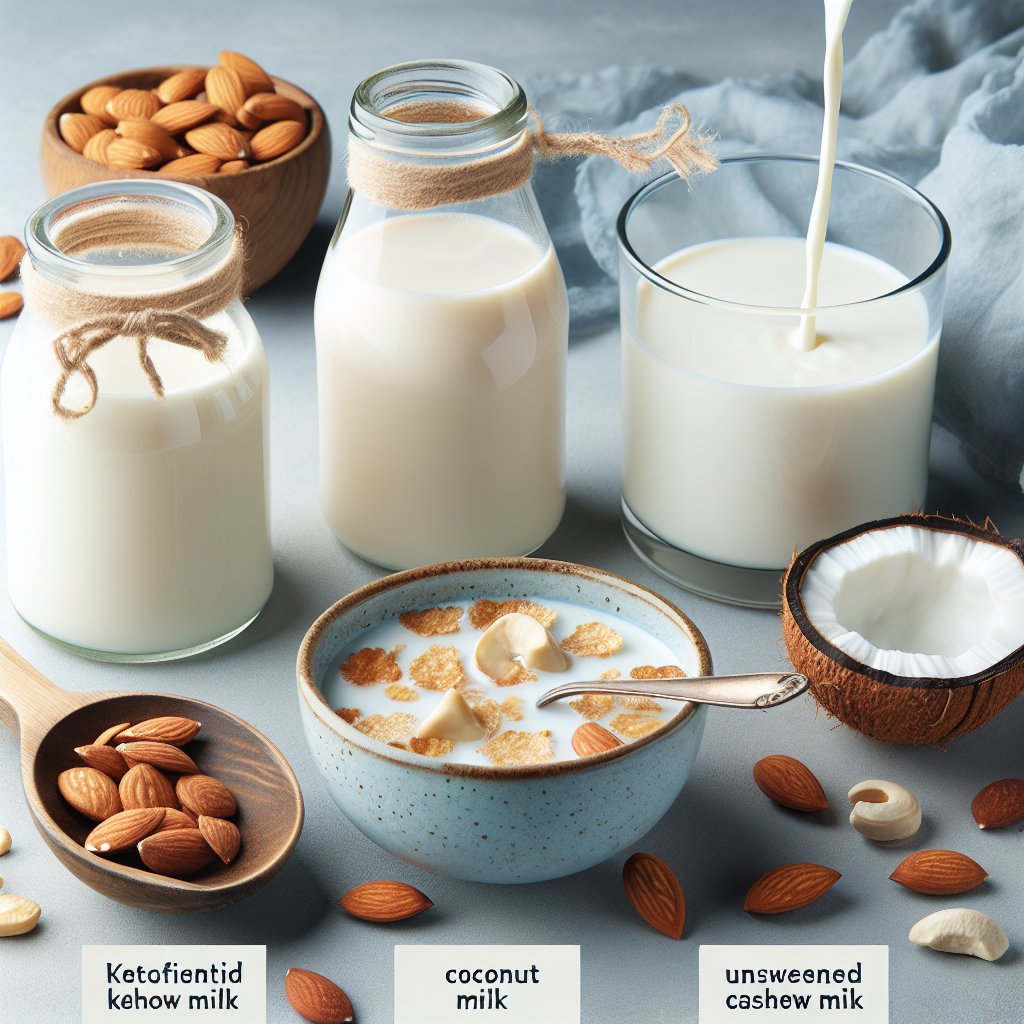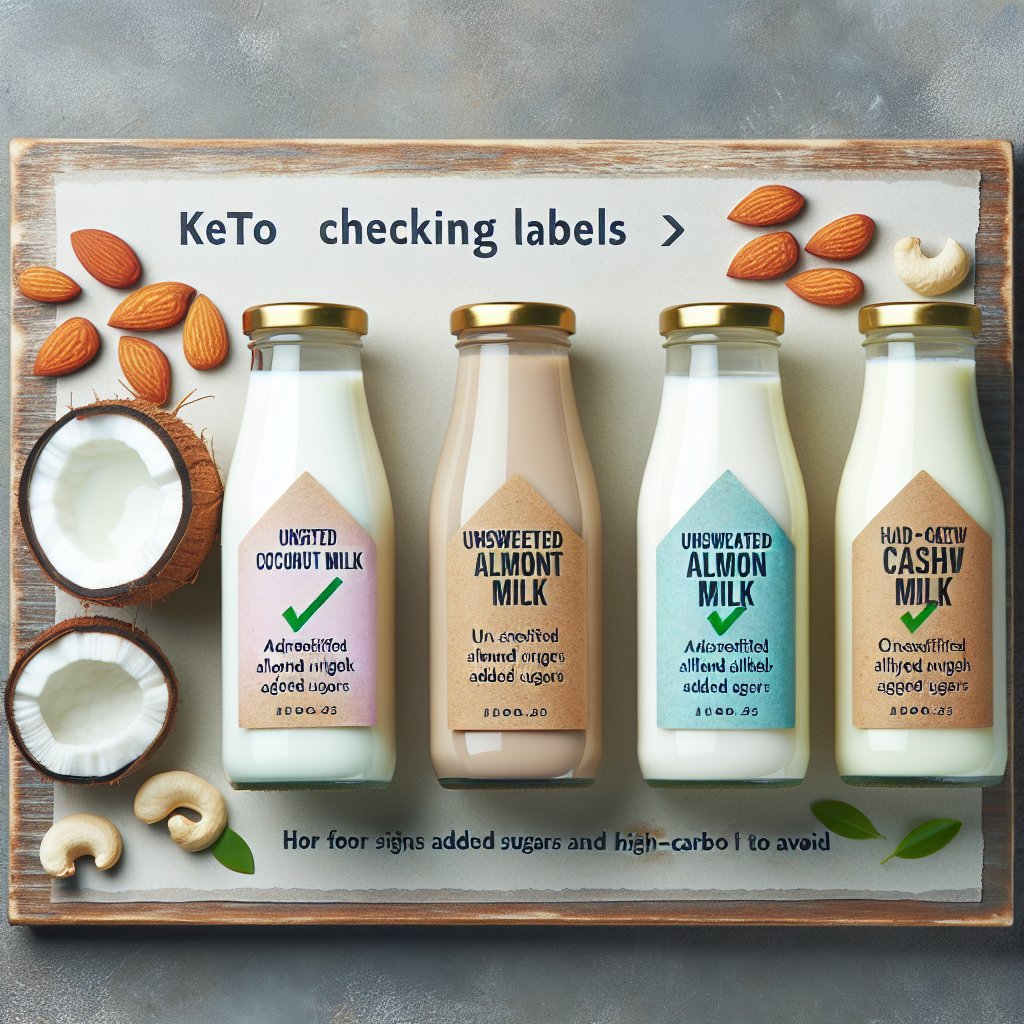Discover the Best Keto-Friendly Milk Options: What Milk Can You Drink on Keto?
Discover the Best Keto-Friendly Milk Options: What Milk Can You Drink on Keto?
Hey there, keto enthusiasts! If you’ve embarked on the journey of the ketogenic diet, you’re not alone. The skyrocketing popularity of the ketogenic diet is undeniable, and it’s not just a passing trend. People are swearing by the remarkable results they have experienced by adopting this low-carb, high-fat lifestyle. But why has the ketogenic diet gained such a massive following?
The Popularity of the Ketogenic Diet
The ketogenic diet has gained immense popularity due to its effectiveness in weight loss and overall health improvement. But what makes it different from other diets? Well, the ketogenic diet, or keto diet, focuses on drastically reducing carbohydrate intake and replacing it with healthy fats. This shift in macronutrient consumption puts the body in a state of ketosis, where it burns fat for fuel instead of carbohydrates.
A growing body of scientific research supports the ketogenic diet’s positive effects on weight loss, blood sugar control, brain function, and more. Many people have also reported increased energy levels and reduced cravings, further adding to its appeal.
However, one aspect that often comes up when discussing the ketogenic diet is the importance of choosing the right type of milk. As milk is a staple in many people’s diets, it’s crucial to find keto-friendly options that align with the principles of the diet.
Importance of Choosing the Right Type of Milk on Keto
When it comes to milk and the keto diet, one of the key factors to consider is the carbohydrate content. Regular cow’s milk contains lactose, a natural sugar that can significantly impact ketosis due to its high carbohydrate content. For example, a cup of cow’s milk can contain around 12 grams of carbs, which is a substantial portion of the daily carb limit for many individuals following the keto diet.
To maintain ketosis, it’s essential to opt for milk alternatives that are lower in carbs. The good news is that there are several keto-friendly milk options available that can seamlessly fit into your daily meal plans. Almond milk, coconut milk, and macadamia nut milk are great low-carb alternatives that provide essential nutrients without jeopardizing ketosis.
By choosing the right type of milk while following the ketogenic diet, you can enjoy your favorite milk-based beverages and recipes without derailing your progress. In the following sections, we’ll delve into the best keto-friendly milk options and explore their nutritional benefits in detail. So, stay tuned to discover the perfect milk choices for your keto lifestyle!

Benefits of Milk on Keto Diet
When it comes to the keto diet, milk has been a topic of discussion. With its array of options and varying macronutrient profiles, it’s important to understand the role of milk in the ketogenic diet, its nutritional value, and how it can contribute to meeting the macronutrient requirements of the diet.
Role of Milk in the Keto Diet
Milk can play a valuable role in the keto diet as it contains essential nutrients such as calcium, potassium, and vitamin D. These nutrients are vital for bone health, muscle function, and overall well-being. Additionally, milk contains protein and fats, which are important macronutrients in the ketogenic diet. The presence of these macronutrients makes milk a potential contributor to meeting the daily requirements of protein and healthy fats while adhering to the keto lifestyle.
Nutritional Value of Milk
The nutritional value of milk varies depending on the type. For instance, whole milk is higher in fat and contains more calories, making it a suitable option for individuals looking to increase their fat intake on the keto diet. On the other hand, unsweetened almond milk is lower in calories and carbohydrates, making it an attractive choice for those who are more carb-conscious. It’s important to consider the nutritional content of different milk options and how they align with your macronutrient targets on the keto diet.
Contribution to Meeting Macronutrient Requirements
Due to its protein and fat content, milk can contribute to meeting the macronutrient requirements of the keto diet. Protein is essential for muscle maintenance and repair, while healthy fats are a key source of energy for individuals following a ketogenic lifestyle. By incorporating milk into your keto meal plan, you can enhance the diversity of your nutrient intake and support your body’s nutritional needs.
It’s important to note that while milk can be beneficial on the keto diet, portion control is crucial, especially for milk with higher carbohydrate content. Being mindful of your overall carbohydrate intake is essential for sustaining ketosis and reaping the benefits of the keto diet.
Considering the role, nutritional value, and contribution to macronutrient requirements, milk can indeed be a valuable addition to a well-planned keto diet.
Types of Milk Allowed on Keto
When following a ketogenic diet, it’s essential to make informed choices about the foods and drinks you consume. This also includes the type of milk you incorporate into your daily routine. Luckily, there are several milk alternatives that align with the macronutrient profile of the ketogenic diet. Let’s discover the best keto-friendly milk options.
Almond Milk
Almond milk is a popular choice for those following a ketogenic lifestyle. It is low in carbohydrates and can be easily incorporated into various recipes. Unsweetened almond milk contains only 1-2 grams of net carbs per serving, making it an excellent option for those aiming to maintain ketosis. Additionally, almond milk is rich in vitamin E, which serves as a powerful antioxidant in the body.
Coconut Milk
Coconut milk is another fantastic milk alternative for individuals on the keto diet. When selecting coconut milk for your ketogenic lifestyle, opt for the unsweetened variety. This type of milk contains lauric acid, a medium-chain triglyceride (MCT) that can be readily converted into ketones by the liver, thus potentially supporting your body’s state of ketosis. Moreover, coconut milk is naturally creamy and can add a delightful texture to both sweet and savory keto dishes.
Unsweetened Cashew Milk
Cashew milk is another keto-friendly milk option to consider. This milk alternative is often enriched with vitamins, particularly calcium and vitamin D. When choosing cashew milk for your keto regimen, ensure that it is unsweetened to avoid unnecessary sugars that could potentially spike your insulin levels. Unsweetened cashew milk typically contains around 1-2 grams of net carbs per serving, making it a suitable choice for those aiming to keep their carb intake low.
When selecting any type of milk for your ketogenic journey, it’s crucial to prioritize unsweetened varieties, as added sugars can significantly impact your body’s ability to stay in ketosis. Always check the nutrition labels to ensure that the milk you choose is low in carbs and free from added sugars.
Whether you prefer almond, coconut, or cashew milk, these keto-friendly options provide versatility in your culinary pursuits while aligning with the principles of the ketogenic diet. By making informed choices about the types of milk you consume, you can continue to savor delicious beverages and dishes without compromising your progress on the ketogenic path.

Nutritional Comparison: What Milk Can You Drink on Keto
When following the ketogenic diet, it’s essential to choose beverages that are low in carbohydrates and high in healthy fats and protein. Many people wonder: what milk can you drink on keto? Let’s explore the nutritional content of various types of milk allowed on the keto diet to find the best options for your lifestyle.
Almond Milk
Almond milk is a popular choice for those following a ketogenic lifestyle. It is low in carbs, with typically 1-2 grams of net carbs per serving. Additionally, almond milk is high in healthy fats, with around 2.5 grams of fat per serving. However, it’s relatively lower in protein, containing only 1 gram per serving.
Coconut Milk
Coconut milk is another excellent option for keto followers. It contains approximately 1 gram of net carbs per serving. In terms of fat content, coconut milk is rich, with around 4.5 grams of fat per serving. However, similar to almond milk, the protein content in coconut milk is relatively lower, at about 1 gram per serving.
Cashew Milk
Cashew milk is gaining popularity as a keto-friendly milk alternative. It contains approximately 1 gram of net carbs per serving and is moderate in fat content, with around 2 grams of fat per serving. However, like other plant-based milks, its protein content is lower, with about 0.5 grams per serving.
Full-Fat Dairy Milk
Full-fat dairy milk, including whole milk, is higher in carbs compared to plant-based options, with approximately 11-12 grams of net carbs per serving. However, it provides a good balance of macronutrients, with around 8 grams of fat and 8 grams of protein per serving.
Summary
When considering what milk you can drink on keto, it’s evident that plant-based options such as almond, coconut, and cashew milk are lower in net carbs and higher in healthy fats, making them suitable choices for the ketogenic diet. However, it’s essential to note that they are relatively lower in protein. On the other hand, full-fat dairy milk contains more carbs but provides a good balance of fats and proteins. Ultimately, the choice of milk on keto depends on individual preferences and nutritional needs.
Experiment with different types of milk to find what works best for you and aligns with your keto goals. Whether you prefer the creaminess of almond milk, the richness of coconut milk, the nutty flavor of cashew milk, or the traditional taste of full-fat dairy milk, there’s a keto-friendly option to suit every palate.
As you navigate the world of keto-friendly milk, remember to consider not only the macronutrient content but also any additional ingredients, such as sugar or additives, as they can impact your ketogenic journey. By making informed choices, you can enjoy delicious and satisfying milk while staying true to your keto lifestyle.
Best Practices for Choosing Keto-Friendly Milk
When it comes to following a ketogenic diet, the type of milk you choose can significantly impact your daily carbohydrate intake. With the abundance of options available in grocery stores, selecting the best keto-friendly milk can be a game-changer in achieving and maintaining ketosis.
Check the Labels for Added Sugars
One of the first things to do when selecting keto-friendly milk is to carefully examine the labels for any added sugars. Many commercial brands of almond, coconut, or flax milk may contain added sugars, which can increase the carbohydrate content.
According to a study published in the American Journal of Clinical Nutrition, consuming added sugars, especially in liquid form like flavored milk, has been linked to a higher risk of obesity and various metabolic disorders. Therefore, it’s crucial to opt for unsweetened varieties to ensure the milk aligns with the low-carb requirements of the ketogenic diet.
Avoid High-Carb Varieties
While exploring the dairy aisle, it’s important to steer clear of high-carb milk options. For example, cow’s milk and most regular soy milk varieties are relatively high in carbohydrates, primarily from lactose and naturally occurring sugars.
Research conducted by the Journal of the Academy of Nutrition and Dietetics indicates that higher intake of high-carbohydrate milk products may lead to insulin resistance, a condition that’s contrary to the goals of the ketogenic diet. Hence, choosing lower-carb alternatives such as unsweetened almond or coconut milk can be a more suitable option for keto enthusiasts.
By following these best practices and staying mindful of added sugars and high-carb content, you can confidently select keto-friendly milk options that support your low-carb lifestyle and keep you on track with your health and wellness goals.

Recipes Incorporating Keto Milk
Now that we’ve explored the best milk options for the keto diet, let’s dive into some delightful keto-friendly recipes that include the use of keto-approved milk alternatives.
Keto Chia Seed Pudding
Chia seed pudding is a versatile, make-ahead breakfast or dessert option that is both nutritious and indulgent. To create a luscious keto-friendly version, simply replace regular milk with unsweetened almond milk or coconut milk. Combine 1/4 cup of chia seeds with 1 cup of your chosen keto milk alternative, a splash of vanilla extract, and a natural keto-friendly sweetener like stevia or erythritol. Refrigerate the mixture overnight and top it with fresh berries or a sprinkle of nuts before serving.
Keto Creamy Broccoli Soup
This keto-friendly soup is not only comforting but also incredibly simple to prepare. In place of regular heavy cream, use unsweetened almond milk or coconut milk to achieve the same velvety texture. Sauté some onions and garlic in olive oil, add chopped broccoli, and then pour in 2 cups of your keto milk alternative and 2 cups of chicken or vegetable broth. Let it simmer until the broccoli is tender, then blend the mixture until smooth. Season with salt, pepper, and a touch of nutmeg for a heartwarming meal on a chilly day!
Keto Golden Milk Latte
Golden milk, a traditional Ayurvedic drink, is known for its anti-inflammatory and immune-boosting properties. For a keto-friendly version, you can use unsweetened coconut milk as a base. In a small saucepan, combine 1 cup of coconut milk, a teaspoon of turmeric, a pinch of cinnamon, a small piece of fresh ginger, and a dash of black pepper. Heat the mixture until it’s steaming, then strain it into a mug. Sweeten lightly with a keto-approved sweetener, if desired, and savor the warm, aromatic flavors.
These recipes showcase the versatility and deliciousness of keto milk alternatives, allowing you to enjoy your favorite dishes while staying true to your keto lifestyle.
Experiment with these recipes and consider incorporating keto-approved milk alternatives like unsweetened almond milk and coconut milk into your cooking. Not only are these options low in carbs, but they also provide beneficial nutrients while keeping your net carb intake in check.
Whether you’re whipping up a creamy soup, a nourishing pudding, or a soothing hot beverage, these keto milk alternatives open up a world of culinary possibilities for your ketogenic journey.
Considerations for Dairy Milk
When it comes to the ketogenic diet, it’s important to be mindful of the milk you consume. While dairy milk is a popular choice for many people, it has some limitations when it comes to the keto diet. Let’s explore why and what alternatives or moderation strategies you can consider.
Higher Carb Content
Dairy milk contains lactose, a natural sugar that contributes to its carbohydrate content. On average, an 8-ounce glass of milk can have around 12-13 grams of carbs, making it a bit higher in carbs than other milk alternatives.
For some individuals following a strict keto diet, especially those aiming for a very low carb intake, the carb content in dairy milk could significantly impact their daily carb allowance. It’s crucial to keep track of your carb consumption, and if you find that regular dairy milk doesn’t fit well within your daily limit, there are alternatives worth exploring.
Moderation or Alternatives
While the carb content in dairy milk may pose challenges for some, it doesn’t mean you have to completely eliminate it from your keto lifestyle. Moderation is key. If you enjoy dairy milk, consider incorporating smaller servings into your meal plan while ensuring it aligns with your overall carb goals for the day.
For those who are more carb-conscious or are seeking dairy-free options, there is a wide range of milk alternatives available that are keto-friendly. Unsweetened almond milk, coconut milk, and macadamia nut milk are great options with significantly lower carbs. These alternatives provide the creamy texture and versatility of dairy milk without the higher carb content.
It’s important to note that not all milk alternatives are created equal. When choosing a milk substitute for your keto lifestyle, be sure to select unsweetened versions to avoid added sugars and unnecessary carbs. Additionally, some milk alternatives may have added thickeners or stabilizers, so it’s always beneficial to carefully read the nutritional labels.
Experimenting with different milk options can be an exciting journey towards discovering what works best for your taste preferences and nutritional needs on the keto diet.
In conclusion, while dairy milk is a wholesome and traditional choice, its higher carb content may not align with the carb restrictions of the keto diet for some individuals. Moderation in consumption or exploring keto-friendly milk alternatives provides the flexibility to enjoy a variety of delicious and satisfying milk options while staying comfortably within your carb limits.
Conclusion
As we conclude, it’s essential to emphasize the significance of making informed choices when selecting milk for a ketogenic diet. The type of milk you consume can greatly impact your carb intake and overall success on the keto lifestyle. Here’s a quick recap of the key points we discussed.
Consider the Carb Content
When choosing milk for a ketogenic diet, it’s crucial to consider the carb content. Dairy milk has a higher carbohydrate content compared to nut-based and alternative milks. Opting for unsweetened almond milk, coconut milk, or macadamia nut milk can significantly reduce your carb intake, making them excellent choices for keto.
Watch Out for Hidden Sugars
Pay attention to hidden sugars in flavored or sweetened milk alternatives. Always check the labels to ensure that the milk you select is free from added sugars and other unwanted additives. Unsweetened options are your best bet for keeping your carb count low.
Factor in the Fat Content
Fat is a primary component of a ketogenic diet. Full-fat dairy milk and certain nut-based milks, such as macadamia nut milk, provide a good source of healthy fats that can support your keto goals. Opting for milk with higher fat content can help you stay satisfied and support ketosis.
Importance of Nutrient Profile
Consider the nutrient profile of the milk you choose. While dairy milk provides calcium and certain vitamins, alternative milks like almond milk and coconut milk offer unique nutritional benefits, such as being rich in antioxidants and providing a source of healthy fats. Diversifying your milk choices can contribute to a well-rounded keto diet.
Final Thoughts
Ultimately, the variety of milk options available on the market offers flexibility for individuals following a ketogenic lifestyle. By being mindful of the carb content, sugar, fat, and nutrient profile of different milk options, you can make informed choices that align with your keto goals.
Remember, there isn’t a one-size-fits-all answer to the question, “What milk can you drink on keto?” The best milk for you on keto will depend on your personal preferences, dietary restrictions, and nutritional needs.
So, whether you enjoy a creamy latte, a refreshing smoothie, or a bowl of keto-friendly cereal, there’s a milk out there that perfectly suits your keto journey. By staying informed and making conscious choices, you can continue to savor the goodness of milk while thriving on your ketogenic diet.


